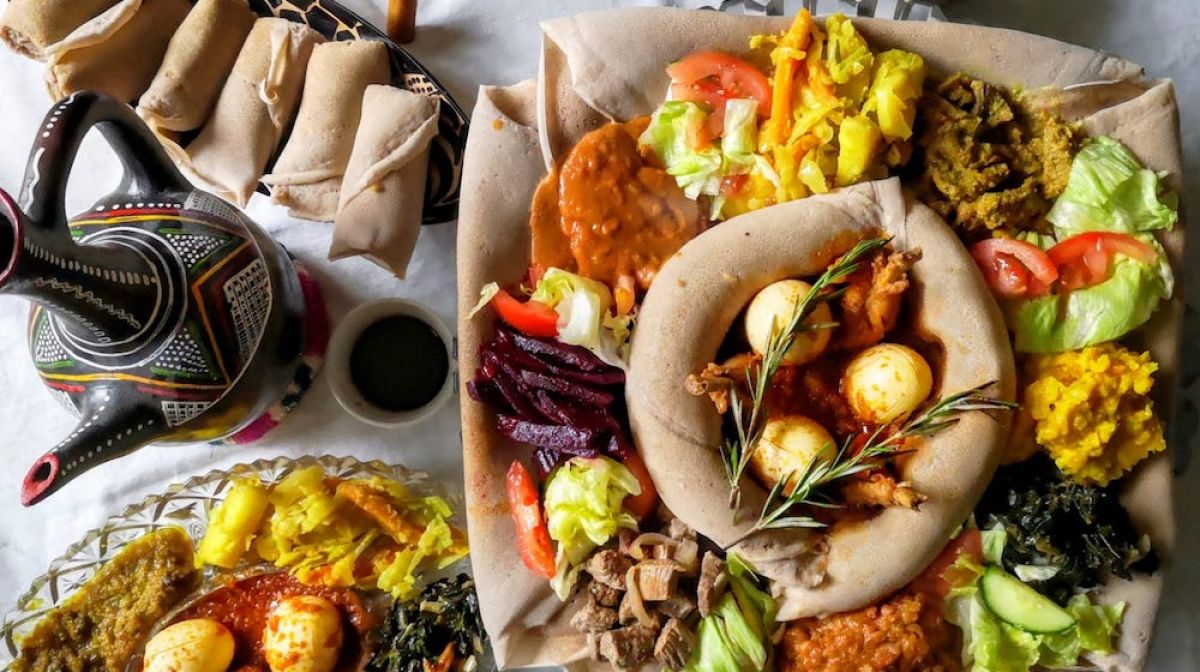On my first night in Addis Ababa, I found myself sitting in a suburban apartment across from the yoga instructor I had met that afternoon. His name was Happy Being. An injera lay between us. The spongy Ethiopian flatbread which I had been warned resembled carpet underlay was piled high with lentil stew, kale and spicy shiro. He ripped a piece of the fermented bread, which happens to act as plate, utensil, and carbohydrate, then crammed in some veg, sopped up some sauce and ominously lifted the greyish parcel towards my mouth: “It’s a sign of respect – to feed one another in Ethiopia. It’s called gursha.”
A year later, now in Dublin, I was one of the lucky few who had booked far enough in advance to get a table at Gursha – Ireland’s first Ethiopian supper club. Mel Roddy, an Ethiopian who was raised in Dublin, quit his job at KBC bank in 2018 to go travelling. It was while he was in Ethiopia that inspiration struck: he decided to create Gursha. And with the help of his friends and family, it opened in August 2019, serving injera two nights a week. It’s been practically sold out since. In January, Gursha moved to another premises, the Legit Coffee Co. on the North Circular Road, where they are able to remain open for three nights per week.
Teff is what makes Ethiopian food special. A seed indigenous to Ethiopia and Eritrea, for centuries it has been milled, fermented with water, and cooked on griddles over open fires to create the tangy pancake known as injera. It’s incredibly healthy; naturally gluten free and high in protein, it might explain the country’s abundance of marathon runners. Other nations began to take notice, and increased exportation of the seed led to a price hike for locals. The government had to freeze the local price, which has meant that it is now expensive to export. Consequently, Ethiopian restaurants are rare, and many of those that do exist in Europe don’t make injera with 100% teff.
Ethiopians will eat injera every day, often thrice. The toppings change, but the usual suspects are shiro wat (a spicy split-pea puree), yebeg tibs (strips of marinated lamb), doro wat (chicken stew), and spicy lentils. Seasonal vegetables complete a meal. Most of the dishes are perfumed with berbere – the Ethiopian chilli spice blend. The flavours are bold: punchy and rich and spicy.
Roddy has all the classics on the menu at Gursha. He wants it to be as authentic as possible: “There have been a couple of times when people have asked us to get it served with rice, and I have just said ‘no, it’s not Ethiopian’. Ethiopia is the only African country that’s never been colonized, so a lot of the traditions and tastes have stayed pretty much the same.” There are no knives and forks on the table. This is an unashamedly Ethiopian restaurant – not an Ethio-Irish blend. And, at Gursha, the food is just as good as I remember in Ethiopia.
Roddy knew from the outset that the Ethiopian community in Ireland (only around 1500 people), would not be enough to sustain the restaurant. He would need Irish people to come, to enjoy the food, and to return. But Ethiopian food is an acquired taste. Or so I thought. Mel tells me that although 90 per cent of guests had never previously tried the cuisine, he is seeing the same names return time and time again: “One couple have come 10 times between January and now; this weekend will be their 11th. At the opening in January, they came Thursday, Friday and Saturday.” And currently, if you want to book a table, you’ll have to wait a month.
But on the back of their success comes a new challenge: finding a full-time premises. This will happen, Roddy tells me, “as soon as possible”. To begin with, it will just serve dinner, but in the second year he plans to have a lunch menu consisting of just the vegan options. More excitingly, Roddy wants the restaurant to have a stage for live music. The entrancing trumpet of Ethio-jazz and pulsating drums will be fuelled by tej – the traditional Ethiopian honey wine.
Ethiopian food, exemplified by Gursha, teaches us how to enjoy food. It’s about more than sustenance. It’s about promoting love and sharing. After stuffing myself with an initial injera, our waiter asked if we wanted more, and along came another massive plate. Roddy says that early reviewers recommended that he raise the price to €30, but he decided to keep it at €25 because that’s what he felt it was worth. It’s about more than the business; he is bringing people together, teaching them communal values through food, and sharing a fascinating and delicious cuisine.






